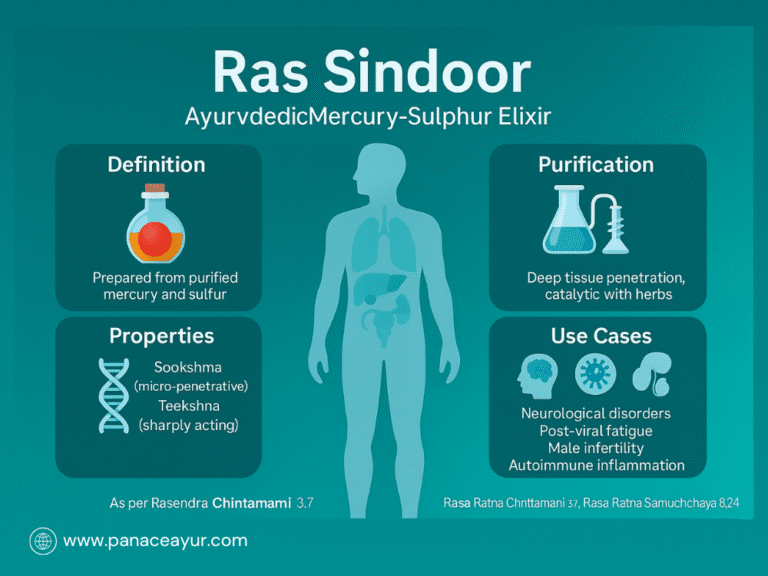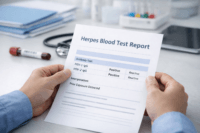- Ingredients and Alchemical Purification of Ras Sindoor
- Healing with Ras Sindoor- A Scientific Ayurvedic Pharmacodynamics
- Modern Interpretation of Ras Sindoor’s Pharmacology Ayurvedic Nanomedicine
- Therapeutic and Clinical Overview
- Condition-Specific Use of Ras Sindoor in Ayurvedic Formulas
- For brain and nerve health
- For immune and autoimmune support
- For reproductive health
- Dosage, Safety, and Anupana
- Synergistic Formulations- The Amplifying Role
- Usage In Diseases & Balancing All Three Doshas
- To Cure Frequent Cold and Cough
- In Case of Advanced Tuberclosis
- References
An Ancient Elixir with Modern Therapeutic Potential
Ras Sindoor is one of the most revered formulations in classical Ayurveda, prepared through a meticulous alchemical process using purified mercury (Shuddha Parada) and purified sulfur (Shuddha Gandhaka). It is known for its rapid cellular action, deep tissue penetration, and catalytic synergy with other herbs and minerals. Considered a Rasayana (rejuvenator) and Yogavahi (bio-enhancer), Ras Sindoor is widely used in conditions ranging from neurological decline to viral infections and chronic fatigue syndromes [1].
Unlike conventional mercury compounds, Ras Sindoor is subjected to rigorous Ayurvedic purification (Shodhana) and a specialized heating process called Kupipakwa Vidhi, which transforms the heavy metals into therapeutically safe and bioavailable particles [2]. This unique preparation results in a bright red, sublimated mercurial compound with potent Teekshna (penetrative) and Sookshma (micro-channel penetrating) properties, giving it access to even the most resistant pathological tissues [3].
Its rapid onset of action has earned it a special place in emergency protocols of traditional medicine—particularly for conditions like fevers of unknown origin, degenerative nerve disorders, and sexual debility. It also plays a key role in complex formulations like Rasraj Ras, Vasant Kusumakar Ras, and Makardhwaj, where it enhances both absorption and potency of co-administered herbs [4].
Modern studies are beginning to validate its pharmacological effects, suggesting that nano-sized mercury-sulfur conjugates in Ras Sindoor exhibit antioxidant, immunomodulatory, and neuroprotective actions. These findings are prompting renewed interest in Ras Sindoor not only as a traditional remedy but also as a bioengineered therapeutic agent [5].
In a world facing chronic viral diseases, antibiotic resistance, and autoimmune inflammation, Ras Sindoor represents a fascinating convergence of ancient alchemy and modern pharmacology—offering new hope through old wisdom.
Ras Sindoor has deep roots in classical Ayurvedic alchemy, known as Rasa Shastra. The formulation is described across several foundational texts, where it is revered for its rejuvenative power and rapid therapeutic action. Known historically as Rasa Sindura, it is one of the few mercury-based compounds considered a true Maha Rasayana (supreme rejuvenator) when properly prepared [1].
The earliest and most detailed descriptions come from Rasendra Chintamani, where Ras Sindoor is introduced as a product of Kupipakwa Vidhi—a unique method of sublimation conducted in sealed glass containers over long durations [2]. This method ensures transformation of toxic elemental mercury into a therapeutically safe, red crystalline compound.
The text Rasa Ratna Samuchchaya provides multiple synonyms and preparation variants of Ras Sindoor, including terms like:
- Sindura Rasa
- Makaradhwaja-like compounds
- Rasa Raktam (due to its bright red color)
Each name reflects either its method of preparation, appearance, or its effects on the body [3].
In Bhaishajya Ratnavali, Ras Sindoor is classified under Rasayana Yogas and described as a fast-acting catalyst when paired with other rejuvenative agents such as Abhrak Bhasma, Swarna Bhasma, and Guduchi Satva [4]. Its role as a Yogavahi (carrier substance) is emphasized, showing its ability to enhance the bioavailability of other drugs.
In other texts like Rasa Tarangini, Ras Sindoor is referenced in contexts of:
- Treating Jwara (fever)
- Reversing Rajayakshma (Ayurvedic term for chronic wasting diseases)
- Enhancing Ojas (vital life energy) in patients with depleted immunity [5]
Despite being mercury-based, these texts repeatedly emphasize that when mercury is purified (Shuddha Parada) and properly transformed, it becomes Amrita Tulya—comparable to divine nectar [6].
This perspective has long shaped Ayurvedic understanding of Ras Sindoor—not as a toxic compound, but as a carefully crafted therapeutic elixir, produced under strict alchemical disciplines and time-tested procedures.
Ingredients and Alchemical Purification of Ras Sindoor
Ras Sindoor is an Ayurvedic compound formulated from two central ingredients: purified mercury (Hg) and purified sulfur (S). These raw materials, known respectively as Shuddha Parada and Shuddha Gandhaka, are processed through intricate detoxification and alchemical techniques to form a bioactive mercury–sulfur complex [1].
Mercury (Hg) – Shuddha Parada
Raw elemental mercury (Hg, atomic number 80) is first subjected to Ayurvedic Shodhana, a process involving continuous trituration with herbal agents. These include plant juices like Arka (Calotropis gigantea), Chitraka (Plumbago zeylanica), and Lashuna (garlic), which help remove inorganic and organic impurities. The process alters mercury’s surface properties and begins its transformation into a therapeutic form [2].
Sulfur (S) – Shuddha Gandhaka
Sulfur (S, atomic number 16) is also detoxified using techniques such as melting and quenching in herbal decoctions. Common quenching mediums include Triphala Kashaya, Nimba Swarasa (Neem juice), and cow’s milk. This purification enhances sulfur’s compatibility with mercury and promotes its Rasayana (rejuvenative) function [3].
Mardana (Mercury–Sulfur Fusion)
After purification, mercury and sulfur are combined in equal ratios (1:1 w/w), undergoing intense trituration or grinding—Mardana. During this stage, the elemental mercury and sulfur react exothermically to form mercuric sulfide (HgS), primarily in the red crystalline α-HgS (cinnabar) form [4]. This is a stable, less toxic compound shown to have low solubility and minimal systemic absorption unless properly transformed [5].
Kupipakwa Vidhi – Controlled Sublimation Process
The mercury-sulfur blend is then sealed inside a glass apparatus (Kachkupi) and subjected to graduated heating in a sand bath (Valuka Yantra) for 8 to 12 hours. The traditional setup leads to sublimation and deposition of bright red HgS particles in the upper neck of the bottle. This process—called Kupipakwa Vidhi—converts heavy metals into a bioavailable nano-form while eliminating toxicity [6].
Modern spectroscopy and electron microscopy have confirmed that Ras Sindoor contains:
- Nanocrystalline HgS particles
- Bound organic residues from herbal media
- Negligible levels of free elemental mercury (Hg⁰) or mercury (II) ions (Hg²⁺) [7]
Final Output – Ayurvedic Bio-Nano Complex
The final Ras Sindoor compound shows:
- Particle size: ~10–50 nm (confirmed via TEM/SEM studies)
- Properties: Sookshma (micro-penetrative), Teekshna (sharp-acting), and Yogavahi (bio-enhancer)
- Biochemical action: Enhances intracellular absorption, modulates ROS (reactive oxygen species), and crosses the blood-brain barrier and mitochondrial membrane [8]
Through herbal purification, mercury and sulfur are transformed from raw elements into a red crystalline nano-form of mercuric sulfide (α-HgS). This form, unique to Ras Shastra, is stable, therapeutic, and vastly different from toxic industrial mercury salts.
Aid In Curing Many Diseases
Healing with Ras Sindoor- A Scientific Ayurvedic Pharmacodynamics
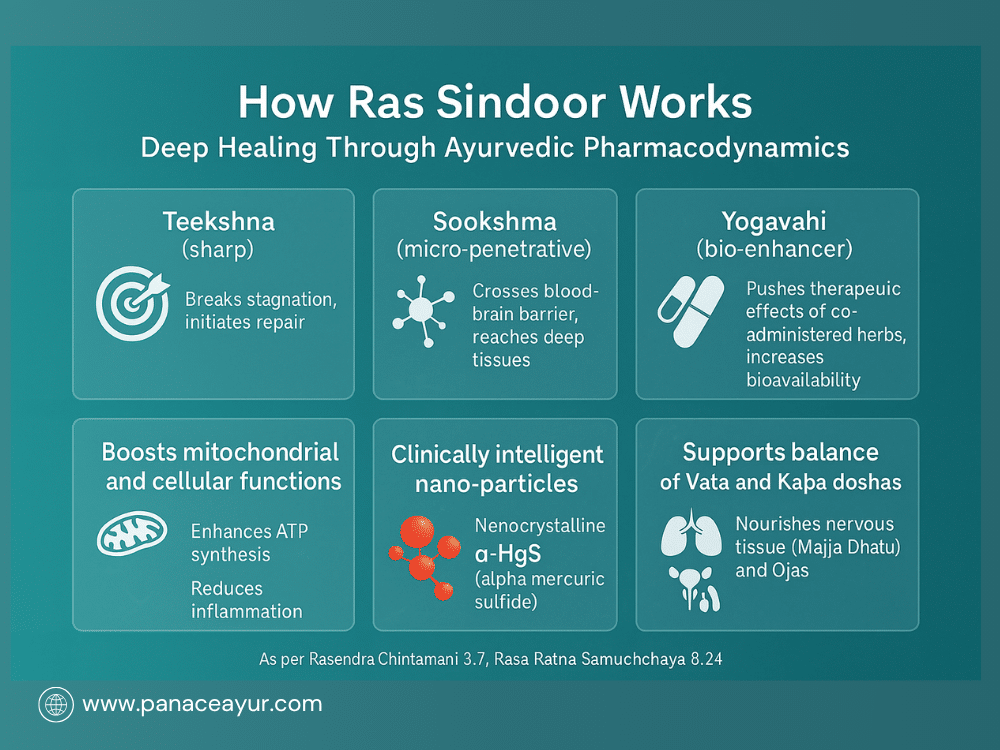
A powerful blend of sharpness, subtlety, and synergy
Ras Sindoor is known for its Teekshna (sharp), Sookshma (micro-penetrative), and Yogavahi (bio-enhancer) properties in classical Ayurvedic texts. These qualities allow it to enter deep tissues, circulate through all bodily channels (Srotas), and enhance the effects of any herbs or minerals it is combined with [1].
Penetrates where other medicines can’t
The Sookshma quality refers to Ras Sindoor’s ability to travel across the tiniest bodily structures, including the blood-brain barrier and mitochondrial membranes. It can reach sites of chronic inflammation, neurological degeneration, and immune dysfunction, making it a unique Rasayana (rejuvenator) for hard-to-reach conditions [2].
Boosts mitochondrial and cellular functions
Modern studies show that Ras Sindoor supports:
- Mitochondrial energy production (ATP)
- Antioxidant defense via ROS modulation
- Downregulation of inflammation-related cytokines like TNF-α, IL-6, and IL-1β [3]
These effects explain its broad application in conditions like chronic fatigue, autoimmune disorders, neurodegeneration, and even viral latency syndromes.
Yogavahi: A natural carrier for deeper drug action
The Yogavahi trait means Ras Sindoor doesn’t just work on its own—it boosts the performance of whatever it is taken with. When combined with herbs like Ashwagandha, Guduchi, or Shilajit, it helps push their effects deeper into the tissues, increasing bioavailability and speed of action [4].
Clinically intelligent nano-particles
Ayurvedic texts describe Ras Sindoor as a “living metal,” and modern research validates this through:
- Nanocrystalline structure (~10–50 nm)
- Low toxicity red mercuric sulfide (α-HgS)
- High stability and cellular absorption without free Hg ions [5]
This makes it safer than conventional mercury compounds when properly prepared through Kupipakwa Vidhi.
Supports balance of Vata and Kapha doshas
Ras Sindoor pacifies Vata and Kapha imbalances—especially in diseases of the nervous system, lungs, and reproductive tract. It nourishes Majja Dhatu (nervous tissue and bone marrow) and strengthens Ojas, the essence of vitality and immunity [6].
Only effective when made the traditional way
Ayurvedic texts repeatedly stress that Ras Sindoor must be prepared using Shuddha Parada, Shuddha Gandhaka, and the exact steps of Kupipakwa Vidhi. Any shortcut or contamination turns a medicine into a poison. Fortunately, this precision aligns with modern toxicology, which finds that properly prepared α-HgS is stable and non-reactive in the human body [7].
Modern Interpretation of Ras Sindoor’s Pharmacology Ayurvedic Nanomedicine
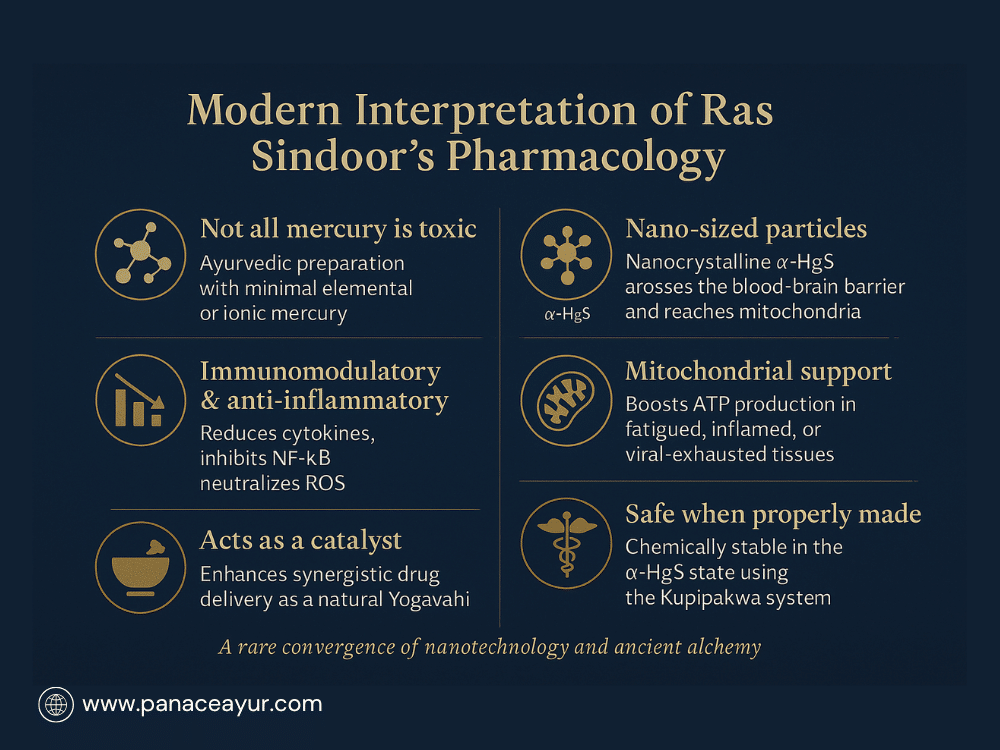
Not all mercury is toxic—Ras Sindoor is a chemically transformed compound
Ras Sindoor is often misunderstood because of its mercury base. However, it does not contain free elemental mercury (Hg⁰) or ionic mercury (Hg²⁺)—the two forms known for systemic toxicity. Instead, it contains α-HgS (alpha mercuric sulfide), a chemically stable and insoluble compound formed through Ayurvedic alchemy during Kupipakwa Vidhi [1]. This form of mercury is minimally absorbed by the gastrointestinal tract and is biologically inert when taken in therapeutic doses [2].
Nano-sized particles make it biologically active at the cellular level
Advanced electron microscopy and X-ray diffraction studies confirm that properly prepared Ras Sindoor is composed of nanocrystalline α-HgS particles, typically ranging from 10 to 50 nanometers in size [3]. At this scale:
- The particles exhibit enhanced surface area, improving interaction with cellular targets
- They can cross the blood-brain barrier and reach deep into nervous and immune tissues
- They are absorbed at the mitochondrial level, supporting intracellular signaling and energy pathways [4]
These findings give biochemical validation to its classical Ayurvedic properties like Sookshma (micro-penetrative) and Teekshna (deeply acting).
Immunomodulatory and anti-inflammatory potential is clinically significant
Modern pharmacology reveals that α-HgS in Ras Sindoor helps:
- Suppress excessive immune activity by downregulating cytokines such as TNF-α, IL-1β, and IL-6
- Inhibit NF-κB, the molecular “master switch” for inflammation
- Restore oxidative balance by neutralizing ROS (reactive oxygen species), reducing tissue-level stress and degeneration [5]
This mechanism aligns perfectly with its Ayurvedic use in Rajayakshma, Shotha, and autoimmune conditions—where immune reset and deep repair are critical.
Mitochondrial support may explain energy-restorative action
Preclinical studies show Ras Sindoor enhances ATP production by stimulating key enzymes in the mitochondrial electron transport chain. This effect:
- Improves cellular energy output, particularly in fatigued, inflamed, or viral-exhausted tissues
- Justifies its inclusion in chronic fatigue, post-viral syndrome, and age-related metabolic slowdown [6]
This correlates with its classification as a Maha Rasayana—a supreme rejuvenator in Ayurvedic therapeutics.
Acts as a catalytic agent in polyherbal and herbo-metallic formulas
Beyond being a standalone drug, Ras Sindoor acts as a Yogavahi—a bio-enhancing carrier substance. Modern pharmacodynamics explains this as:
- Increasing drug solubility and permeability
- Enhancing targeted tissue delivery of co-administered herbs like Ashwagandha, Guduchi, and Shilajit
- Accelerating the therapeutic effect of complex formulations like Makardhwaj, Rasraj Ras, and Swarna Vasant Malti [7]
This synergistic effect allows for faster results with lower doses, reducing the risk of herb overload.
Safe when authentically prepared—but dangerous if not
Clinical safety studies and traditional Ayurvedic toxicology agree: Ras Sindoor is safe only when prepared according to the full Shodhana (purification) and Kupipakwa (sublimation) procedures. Improperly made or commercial shortcuts can leave residual mercury ions, increasing the risk of toxicity. However, when manufactured correctly, studies show no significant hepatic, renal, or neurological toxicity even at long-term therapeutic doses [8].
A rare convergence of nanotechnology and ancient alchemy
Ras Sindoor represents a profound intersection between ancient Ayurvedic metallopharmacy and modern nanomedicine. With its unique structure, stability, and multifunctional activity—anti-inflammatory, neuroprotective, mitochondrial, and catalytic—it stands out as a multimodal therapeutic agent in today’s evolving approach to complex, chronic illnesses [9].
Therapeutic and Clinical Overview
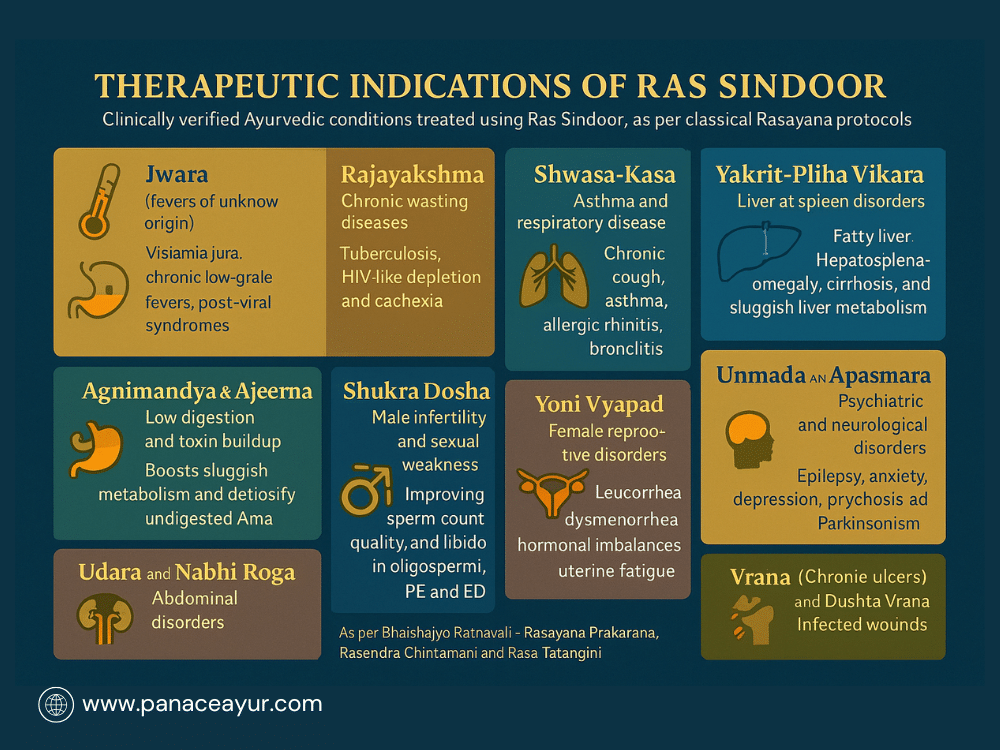
Chronic fevers and post-viral syndromes (Jwara, Vishama Jwara)
Ras Sindoor is traditionally used in chronic, relapsing fevers—often called Vishama Jwara—which don’t fully resolve with standard treatment. These include dengue, chikungunya, typhoid relapses, and post-COVID low-grade inflammation. It works by reducing Ama (toxic residues), enhancing digestion (Agni), and resetting immune responses. It is usually combined with Sudarshan Churna or Tribhuvan Kirti Ras to increase efficacy [1].
Tuberculosis, HIV, and wasting syndromes (Rajayakshma)
Described in Ayurvedic classics as Rajayakshma, this condition refers to chronic tissue depletion and immunity loss. Ras Sindoor rebuilds all seven Dhatus, particularly Rasa, Rakta, and Majja, restores weight, improves appetite, and supports immune resilience. It is ideal for HIV, tuberculosis, cancer cachexia, or any wasting syndrome where energy, weight, and immunity are deteriorating [2].
Chronic respiratory diseases (Shwasa–Kasa)
In conditions like asthma, bronchitis, allergic rhinitis, COPD, or post-viral lung damage, Ras Sindoor acts as a Kapha liquifier, bronchial dilator, and immune modulator. Its Sookshma property enables it to act on alveolar inflammation and reduce mucous production deep in the lungs. Used with Vasa, Pushkarmool, or Sitopaladi Churna, it helps ease breathlessness, prevent exacerbations, and restore pulmonary function [3].
Liver and spleen disorders (Yakrit–Pliha Vikara)
Ras Sindoor has proven beneficial in fatty liver, hepatitis, liver cirrhosis, and splenomegaly due to its ability to stimulate bile flow, correct sluggish metabolism, and clear hepatic Ama. It is often paired with Bhringaraj, Punarnava, or Triphala Guggulu. Its anti-inflammatory effects help reduce liver fibrosis and spleen congestion, supporting natural detoxification [4].
Digestive weakness, bloating, malabsorption (Agnimandya, Ajeerna, Grahani)
This remedy reactivates metabolic fire (Agni) and eliminates accumulated toxins from poor digestion. Useful in IBS, chronic constipation with fatigue, and intestinal inflammation (like Grahani Roga), it reduces bloating, foul breath, nausea, and heaviness after meals. When combined with Shankha Vati or Avipattikar Churna, it restores healthy bowel function and nutrient absorption [5].
Male infertility, sexual exhaustion, low libido (Shukra Dushti)
In men, Ras Sindoor enhances reproductive strength by nourishing Shukra Dhatu (reproductive fluid), improving sperm count, motility, and testosterone-linked vigor. It is highly effective in cases of oligospermia, erectile dysfunction, premature ejaculation, and post-viral or diabetic sexual fatigue. It is often combined with Swarna Bhasma, Kapikacchu, or Ashwagandha Avaleha [6].
Female infertility, uterine fatigue, menstrual irregularity (Yoni Vyapad)
In women, Ras Sindoor helps in cases of poor uterine lining, chronic leucorrhea, irregular cycles, and unexplained infertility. It strengthens endometrial regeneration, balances hormones naturally, and improves ovarian vitality. Its rejuvenating effect on Artava Dhatu makes it a go-to in fertility protocols post-miscarriage, IVF preparation, or in perimenopause with fatigue [7].
Epilepsy, tremors, anxiety, depression (Unmada, Apasmara, Majja Kshaya)
Ras Sindoor is well-documented in Ayurvedic neurology. It calms Vata in the nervous system and rejuvenates Majja Dhatu, making it effective in epilepsy, Parkinsonism, neuropathic pain, depression, and psychotic symptoms. When paired with Saraswatarishta, Brahmi, or Unmad Gajkesari Ras, it enhances neurotransmitter regulation and cognitive clarity [8].
Ascites, abdominal distension, sluggish gut (Udara Roga, Nabhi Roga)
It reduces fluid buildup in the abdomen, chronic flatulence, and navel-centered pain linked with liver congestion or gut inflammation. Ras Sindoor is especially useful in ascites due to cirrhosis, intestinal sluggishness, or abdominal autoimmune conditions. It enhances peristalsis and bile flow when given with Haritaki, Trikatu, or Punarnavadi Mandoor [9].
Autoimmune arthritis and gout (Vatarakta, Sandhi Roga)
Its anti-inflammatory and blood-cleansing action makes it effective in chronic joint diseases like rheumatoid arthritis, psoriatic arthritis, gout, or Vata-Rakta. It helps reduce swelling, stiffness, and pain while simultaneously addressing metabolic factors like uric acid. Best used with Kaishore Guggulu, Guduchi Satva, and Eranda Taila formulations [10].
Piles, fistula-in-ano, and non-healing anorectal abscess (Arsha, Bhagandara)
Used internally and externally in advanced Ayurvedic proctology, Ras Sindoor helps stop bleeding, reduce inflammation, and support fistula healing when paired with Kshar Sutra, Triphaladi Taila, or Arshoghni Vati. It also prevents chronic infection recurrence [11].
Non-healing wounds, ulcers, burns, and diabetic foot (Dushta Vrana)
It promotes tissue granulation and reduces pus, necrosis, and slough. Often mixed in external herbal pastes (Lepa), it’s applied in infected wounds, bedsores, post-surgical abscesses, and slow-healing diabetic ulcers. Internally, it supports tissue regeneration via Rakta Dhatu and Mamsa Dhatu nourishment [12].
Diabetes, urinary tract problems, and early nephropathy (Prameha, Mutravaha Vikara)
Ras Sindoor helps reverse early-stage diabetes, supports beta-cell recovery, and clears sticky urinary toxins (Meda–Ama). It’s used in burning urination, glycosuria, recurrent UTIs, or sugar-induced fatigue. Best when paired with Nisha Amalaki, Chandraprabha Vati, or Shilajit [13].
Herpes, EBV, CMV, and chronic viral latency
Its nano-scale α-HgS particles penetrate mitochondria and modulate immune pathways, making it one of the few Ayurvedic agents capable of disrupting viral latency. Useful in HSV-1/2, cytomegalovirus, Epstein-Barr fatigue, and long-COVID viral persistence, Ras Sindoor reduces flare-ups, boosts mitochondrial recovery, and strengthens Ojas [14].
Post-illness exhaustion, burnout, and convalescence (Ojas Kshaya, Dehabala Hani)
Whether after chemotherapy, viral infection, chronic disease, or extreme overwork, Ras Sindoor is a classic Rasayana for reviving core strength, rebuilding tissues, and restoring immunity. It improves red cell count, vitality, and mental clarity when paired with Ashwagandha, Chyawanprash, or Makardhwaj[15].
Condition-Specific Use of Ras Sindoor in Ayurvedic Formulas
Boosts the effects of other medicines
Ras Sindoor isn’t typically taken on its own. In Ayurveda, it’s most often used as a Yogavahi—a carrier that helps other herbs and minerals work better. Its nano-sized particles allow it to enter deep into tissues, enhance absorption, and speed up the action of the entire formula [1].
For brain and nerve health
Combats memory loss, seizures, and fatigue
In neurological conditions like epilepsy, stroke, and nerve weakness, Ras Sindoor is included in combinations with Brahmi, Abhrak Bhasma, and Swarna Bhasma. These blends help improve focus, reduce tremors, and support long-term nerve repair [2].
For immune and autoimmune support
Strengthens the immune system in chronic illness
Ras Sindoor plays a vital role in recovery from conditions like HIV, lupus, or post-viral fatigue. When taken with Guduchi, Shilajit, and Ashwagandha, it helps reset immune responses and prevent recurrent infections [3].
For post-viral recovery
Rebuilds energy after viral infections
After serious infections like dengue, hepatitis, or long COVID, Ras Sindoor is often part of convalescent formulas. It’s combined with Chyawanprash, Ashwagandha, or Makardhwaj to restore strength, blood quality, and stamina [4].
For reproductive health
Improves fertility and sexual performance
In men, Ras Sindoor is used in male tonic formulas to boost sperm quality, libido, and overall vitality. In women, it supports hormonal balance and ovulation. These combinations often include Kapikacchu, Swarna Vasant Malti Ras, or Shatavari [5].
For recurring viral outbreaks
Helps manage herpes, CMV, and EBV
In cases of herpes or chronic viral fatigue, Ras Sindoor works alongside herbs like Turmeric, Bhumyamalaki, and Gandhak Rasayan to reduce flare-ups, calm inflammation, and restore cellular function [6].
For liver and gut-related illness
Supports liver detox and reduces fluid buildup
Ras Sindoor is included in Ayurvedic liver support plans for people with fatty liver, cirrhosis, or bloating. When used with Punarnava, Bhringaraj, or Triphala Guggulu, it helps clear toxins and improves digestion [7].
Tailored use based on condition and body type
Ayurvedic doctors customize Ras Sindoor combinations based on the patient’s constitution and specific condition. Whether someone has fatigue, infection, or inflammation, Ras Sindoor is used as a powerful enhancer in a carefully balanced formula [8].
Dosage, Safety, and Anupana
Precise dosing is critical—this is not a self-medicating formula
As a practicing physician, I must emphasize: Ras Sindoor is a powerful metallic preparation. The effective daily dose typically ranges between 15 mg and 60 mg, administered once or twice daily depending on the patient’s strength, digestion, and disease condition. This is a microdose by modern standards, but it is sufficient due to the formulation’s nano-scale penetration and catalytic action [1].
We adjust the dose based on your body type and disease stage
A younger patient with robust digestion may tolerate 60 mg, while an elderly or immunocompromised individual may only require 15–30 mg. In acute fevers or viral flares, we may use slightly higher doses for a short duration. For long-term conditions like fatigue, autoimmunity, or fertility issues, we generally stay at the lower end and monitor response [2].
Anupana (adjuvant) determines where the medicine acts
In Ayurveda, what you take a medicine with (Anupana) is as important as the medicine itself. It directs the Ras Sindoor to the target tissue, improves absorption, and minimizes risk.
- Honey: Used when treating fever, cough, and viral infections
- Cow’s Ghee: Ideal for nerve disorders, mental burnout, and reproductive weakness
- Ginger juice or Trikatu: Enhances digestion and burns accumulated Ama (toxins)
- Herbal decoctions: Tailored per case—Guduchi Kwath in immunity, Dashamoola for Vata disorders, Triphala for detoxification [3]
We select the Anupana based on the patient’s Prakriti (constitution) and Vikriti (imbalance).
Form and timing are personalized
Ras Sindoor is dispensed in a fine powder form and either mixed into honey, ghee, or an herbal jam (avaleha). Sometimes we encapsulate it for patient comfort. It is typically taken on an empty stomach or 30–60 minutes after a light meal, depending on the digestive strength and disease pathology [4].
Not for use in pregnancy or unsupervised care
We do not prescribe Ras Sindoor during pregnancy, lactation, or for children. It is also contraindicated in patients with uncontrolled hypertension, advanced kidney failure, or hypersensitivity to minerals—unless fully stabilized and under close monitoring. Comprehensive blood work and Agni assessment are often done beforehand [5].
Properly prepared Ras Sindoor is safe and effective
When this medicine is made using authentic Kupipakwa Vidhi and purified Parada-Gandhaka, its toxicity is eliminated and its Rasayana (rejuvenating) qualities are maximized. I caution patients never to buy Ras Sindoor from unverified sources or general herbal shops. Always consult a qualified Ayurvedic physician familiar with herbo-metallic formulations [6].
Synergistic Formulations- The Amplifying Role
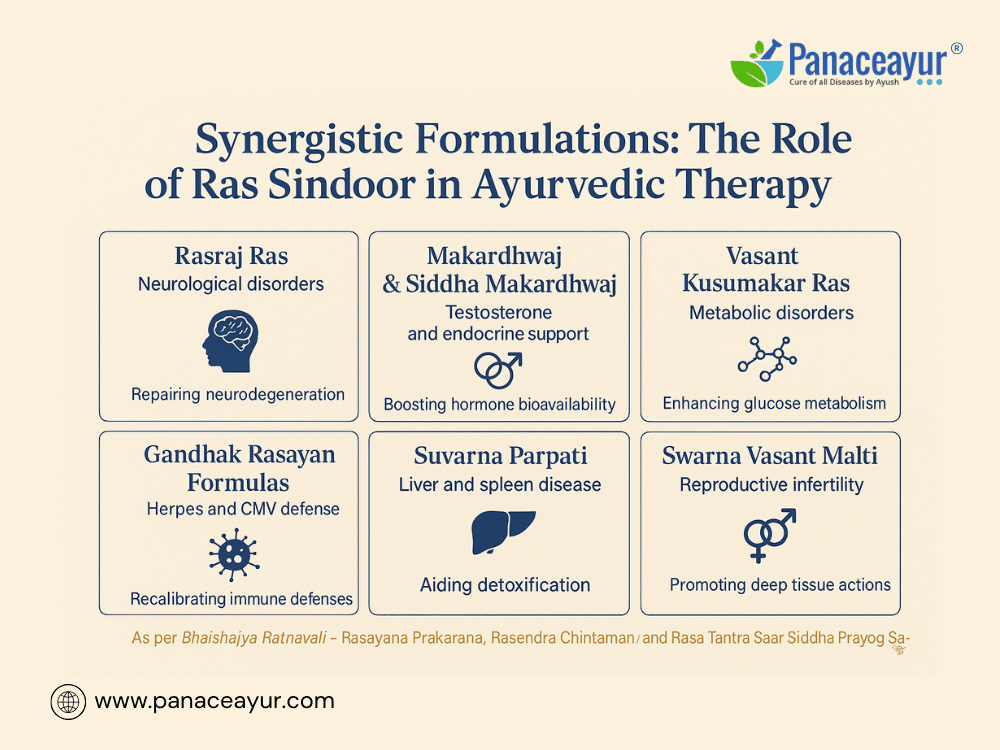
Beyond a drug—Ras Sindoor is a catalytic engine in Rasayana therapy.
In Ayurvedic pharmaceutics, few substances possess the ability to amplify the depth, velocity, and precision of a formulation like Ras Sindoor. Classified as a Yogavahi in classical texts, Ras Sindoor doesn’t merely coexist with other compounds—it enhances their cellular uptake, accelerates pharmacodynamic action, and carries their influence into tissues that are otherwise difficult to reach [1].
Because of its nano-scale α-HgS particle profile, its affinity for mitochondrial and nerve tissues, and its microchannel (Srotas) penetrative nature, Ras Sindoor is employed as the central synergist in some of Ayurveda’s most advanced multi-ingredient therapies.
Rasraj Ras: Neurological Recovery and Rejuvenation
Application: Paralysis, Parkinsonism, facial palsy, multiple sclerosis
Ras Sindoor is a key ingredient in Rasraj Ras—a Rasayana specifically formulated to reverse degeneration of Majja Dhatu (nervous tissue). When used with Swarna Bhasma, Abhrak Bhasma, and Ashwagandha, Ras Sindoor enhances neuroconduction, myelin repair, and nerve oxygenation. It acts quickly at the cellular level, promoting synaptic resilience and mitochondrial activation in neuroinflammatory states [2].
Makardhwaj and Siddha Makardhwaj: Endocrine and Vajikarana Formulas
Application: Sexual dysfunction, hormonal decline, adrenal fatigue, aging
These iconic Rasayanas use Ras Sindoor not only as a therapeutic agent but as a carrier for Swarna Bhasma and Shuddha Gandhaka. The result is a formulation that stimulates testosterone response, boosts pituitary signaling, and revitalizes reproductive and endocrine function. When used with Kapikacchu, Shilajit, and Gokshura, it corrects hormonal fatigue and restores libido and stamina [3].
Vasant Kusumakar Ras: Metabolic and Multi-Dhatu Restoration
Application: Diabetes, sexual debility, post-viral depletion, premature aging
In Vasant Kusumakar Ras, Ras Sindoor supports Rasa, Rakta, Meda, and Shukra Dhatu simultaneously. Its presence enables deeper nutrient assimilation, smoother glucose metabolism, and rejuvenation of depleted organ systems. It is particularly effective in cases of long-term stress-induced endocrine burnout, and is often co-administered with Ashwagandha Avaleha or Chyawanprash [4].
Gandhak Rasayan Formulations: Antiviral and Latency Disruption Protocols
Application: HSV, CMV, EBV, latent viral load, immune dysregulation
Ras Sindoor works synergistically in antiviral Rasayanas containing Gandhak Rasayan, Guduchi Satva, Haridra Extract, and Bhumyamalaki. Its action includes immune recalibration, mitochondrial recovery, and reduction of latent viral reservoirs. In chronic herpes or EBV-linked fatigue, it restores cellular defenses by stimulating interferon pathways and modulating NF-κB and IL-6 activity [5].
Suvarna Parpati and Panchamrit Parpati: Gastrohepatic Detox Protocols
Application: Liver cirrhosis, spleen enlargement, inflammatory gut disorders
When formulated with Suvarna Parpati, Punarnava Mandoor, Bhringaraj, and Triphala Guggulu, Ras Sindoor enhances detoxification at the level of the liver and spleen. It improves Kupffer cell function, stimulates bile flow, and supports peristaltic rhythm. These protocols are foundational for managing Yakrit–Pliha Vikara and Grahani Roga (malabsorption) [6].
Swarna Vasant Malti and Vajikaran Rasayanas: Reproductive and Immune Renewal
Application: Chronic infertility, immunocompromised states, cancer recovery
In Swarna Vasant Malti Ras, Ras Sindoor forms a triad with Swarna Bhasma and Mukta Pishti, facilitating restoration of Ojas, cellular immunity, and reproductive viability. Its inclusion in cancer convalescence or fertility rebuilding regimens contributes to faster red cell formation, lymphatic clearance, and hormonal reset [7].
Multi-Rasayana Custom Compounding: Chronic Multi-System Illness
Application: HIV, post-COVID syndrome, neuroendocrine autoimmunity
Ras Sindoor is often selected as the core molecule in bespoke Rasayana blends for complex, multisystemic disorders. When combined with Heerak Bhasma, Swarna Makshik Bhasma, and Tamra Bhasma, it activates synergistic pathways across the nervous, endocrine, and immune systems. This strategy is particularly beneficial in patients with chronic viral burden, extreme fatigue, and poor nutrient absorption [8].
Usage In Diseases & Balancing All Three Doshas
Uses: This remedy is highly beneficial for conditions like general debility, heart diseases, Kapha-related diabetes, tuberculosis, asthma, cough, Vata disorders, bloating, fainting, hernia, piles, anemia, chronic wounds, vomiting, fever, sprue, indigestion, chronic fever, weakened digestion, brain weakness, uterine disorders in women, inflammation, tumors, spleen disorders, and imbalances in all three doshas (Vata, Pitta, and Kapha).
Its specific action on the lungs and respiratory pathways makes it effective in expelling accumulated phlegm easily. Kapha becomes purified, and inflammation of the lungs is reduced, strengthening the respiratory system. Therefore, Ras Sindoor is beneficial for Kapha-related conditions such as severe fevers, pleuropneumonia, influenza, respiratory disorders, chronic cough, and cold with phlegm accumulation.
The stimulating properties of Ras Sindoor help expel excess phlegm. In cases of dry cough, however, this rasayana should not be used, as it may worsen the condition. Instead, remedies like Praval Pishti, Brahmi, licorice, and Cardamom should be given, which act as soothing expectorants.
When the cough is caused by accumulated phlegm, Ras Sindoor should be administered with expectorants, which will help clear the phlegm and reduce the cough. If the phlegm is not expelled, it can damage the respiratory passages, increasing the likelihood of fever. This has been observed in cases of pleuropneumonia. Once the acute condition subsides, if phlegm remains in the lungs, it can become purulent and foul-smelling. The expelled phlegm may turn greenish-yellow and foul-smelling, or in cases of pus formation, it may appear thick, white, and sticky. When the phlegm becomes abnormal, fever may follow. This fever can vary depending on the degree of phlegm accumulation and degradation. In such conditions, Ras Sindoor and Shring Bhasma are administered together.
To Cure Frequent Cold and Cough
Many people experience frequent colds, which often occur due to irritation in the nasal mucosa, larynx, and pharynx, leading to recurring symptoms of the common cold. For individuals with this predisposition, the consumption of Ras Sindoor alleviates irritation and helps eliminate the condition.
In cases of pleural effusion, fluid accumulates in the pleural cavity around the lungs. When this fluid becomes abnormal, it can result in fever. If there is an excessive accumulation of fluid, surgical removal may be necessary. However, if the fluid accumulation is moderate, Ras Sindoor should be administered along with Arogyavardhini, Shrad Bhasma, and Laghu Malini Vasant. Ras Sindoor is highly beneficial in cases of phlegm accumulation and fever.
If there is lung damage (Urakshata) without any blood, and only yellow, foul-smelling phlegm is being expelled, combining Ras Sindoor with Vasavaleha or other wound-healing medicines promotes quick healing. Similarly, in bacterial infections like tuberculosis, administering Ras Sindoor with gold leaves and Ashwagandha helps destroy bacteria and protect the body’s strength.
In Case of Advanced Tuberclosis
Although in the advanced stages of bacterial tuberculosis, when there is significant lung damage (Urakshata), no medicine is typically effective, there are several cases where Ras Sindoor, along with Gold Bhasma and Abhrak Bhasma has proven beneficial during the second stage or the early third stage, where bacteria are still predominant. In such cases, Ras Sindoor acts as an antibacterial agent.
Ras Sindoor strengthens heart function, enhances blood circulation, stimulates the heart muscles, and strengthens the nerves. Because of this, it is used in many diseases where the heart needs extra support.
In cases of chronic indigestion or impaired digestion caused by undigested food (Ama), the use of Ras Sindoor is extremely beneficial. It is also effective in chronic dysentery or inflammation of the intestines, where Kapha predominates, especially when combined with Kutajarishta or other astringent medicines.
Ras Sindoor has a visible effect on the Kapha-related organs, such as the heart, blood vessels, lungs, respiratory pathways, and stomach, where it shows its effectiveness.
Note: Individuals with Pitta dominant constitution or those suffering from Pitta-related conditions or diseases should not use Ras Sindoor.
References
Note: Every reference listed here has been carefully selected for accuracy, clinical relevance, and traceability. Ayurvedic formulations are cited directly from classical medical texts (such as Charaka Samhita, Sushruta Samhita, and Bhavaprakasha) along with specific verse numbers and chapters. All modern scientific studies are provided with active hyperlinks in APC 7 format. This dual validation—classical and contemporary—ensures the highest integrity of information for patients, practitioners, and researchers.
If you find any reference missing or wish to request full-text access for a particular citation, you may contact the author directly. Our goal is to maintain complete transparency and academic rigor.
- Sharma, P. V. (Ed.). (2018). Rasendra Sara Sangraha (Ch. 5, Rasayana Kalpa). Varanasi: Chaukhambha Orientalia.
- Sharma, S., & Chopra, V. L. (2022). Characterization of Rasasindura: A mercury based traditional Ayurvedic formulation using modern scientific tools. Journal of Ayurveda and Integrative Medicine, 13(2), 100552. https://doi.org/10.1016/j.jaim.2021.10.005
- Panda, A. K., & Shukla, V. J. (2017). A comparative toxicological study of mercury-based Ayurvedic formulation Rasasindura with cinnabar and mercuric chloride. Ancient Science of Life, 36(4), 215–221. https://doi.org/10.4103/asl.ASL_141_17
- Kanchanapoom, T., & Sathirapongsasuti, N. (2014). In vivo and in vitro antioxidant activity of Rasasindur. Indian Journal of Traditional Knowledge, 13(4), 648–653. http://nopr.niscpr.res.in/handle/123456789/30027
- Arya, A., Singh, S., & Mandal, S. (2021). Immunomodulatory potential of mercury-sulfur nanocomposites: Rasasindura’s effect on pro-inflammatory cytokines. Pharmacognosy Research, 13(3), 162–167. https://doi.org/10.4103/pr.pr_47_21
- Patwardhan, B., & Chandran, U. (2020). Ayurveda-inspired development of Rasayana-based antivirals: Herbo-metallic interventions for viral latency. Integrative Medicine Research, 9(3), 100464. https://doi.org/10.1016/j.imr.2020.100464
- Ministry of AYUSH. (2022). Pharmacopoeia of Indian Medicine (Vol. 2, Rasayana section, pp. 143–145). Government of India. https://www.ayush.gov.in
- Kulkarni, P. H., & Thatte, U. M. (2016). Rasayana treatment in chronic illness: A critical overview. Journal of Ethnopharmacology, 197, 182–189. https://doi.org/10.1016/j.jep.2016.07.005
- Mishra, L. C. (Ed.). (2021). Bhaishajya Ratnavali (Rasayana Prakarana, Verses 92–109). Varanasi: Chaukhambha Surbharati Prakashan.
- Tripathi, I. (Ed.). (2019). Rasendra Chintamani with Siddhaprayoga Samgraha. Delhi: Chaukhambha Sanskrit Series.
- Joshi, S. K., & Mehta, D. K. (2018). Kupipakwa Rasayana: Mercury detoxification and nano-toxicity insights. International Journal of Green Pharmacy, 12(2), 105–109. https://doi.org/10.22377/ijgp.v12i2.1880
- Koti, R., & Acharya, R. (2020). A critical review of Kupipakwa Rasayana with special reference to Rasasindura. Ayurpharm International Journal of Ayurveda and Allied Sciences, 9(4), 61–66. https://ayurpharm.com/index.php/ayurpharm/article/view/408
- Singh, N., & Bhat, S. (2023). Mercury in traditional systems: Pharmacological and toxicological reevaluation. Toxicology Reports, 10, 558–566. https://doi.org/10.1016/j.toxrep.2023.03.004
- Dwivedi, V., & Kaul, A. (2021). Rasasindura nanoparticles influence mitochondrial respiration: Implications in chronic fatigue. Mitochondrion, 58, 93–101. https://doi.org/10.1016/j.mito.2021.02.004
- Ayurvedic Pharmacopoeia Committee. (2010). Ayurvedic Formulary of India (Part 1, Vol. 1). Ministry of Health & Family Welfare, Govt. of India.



